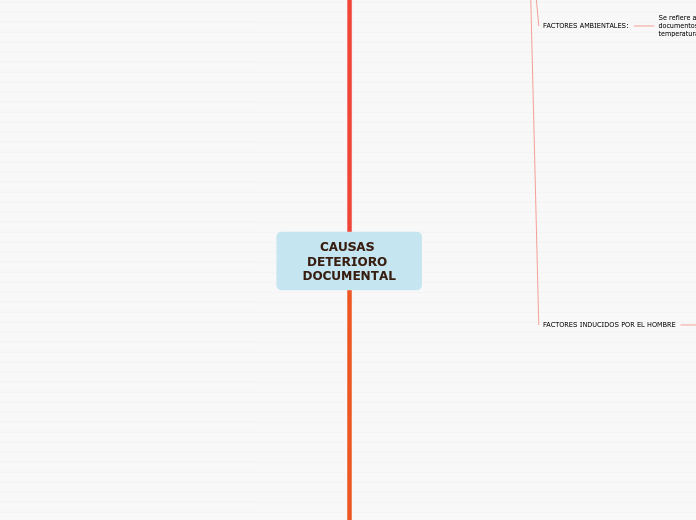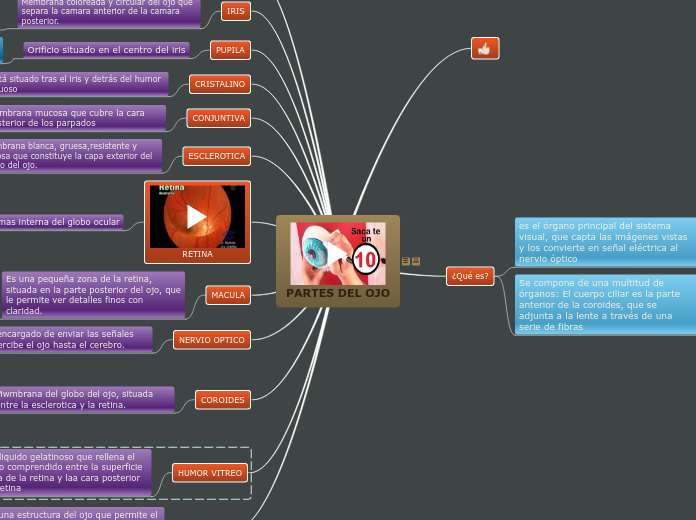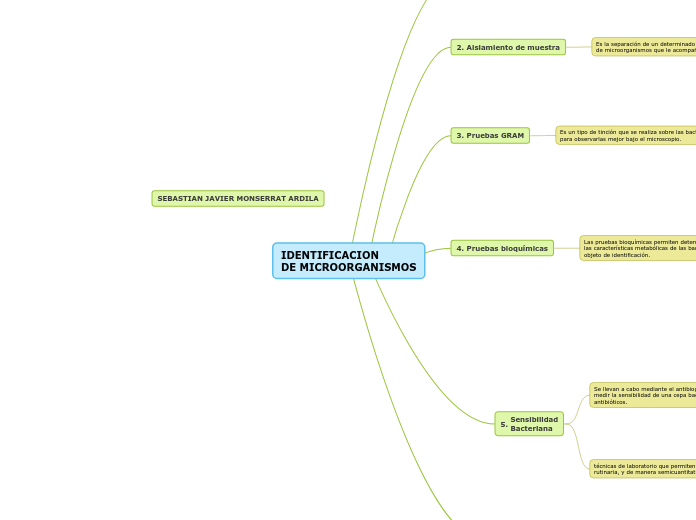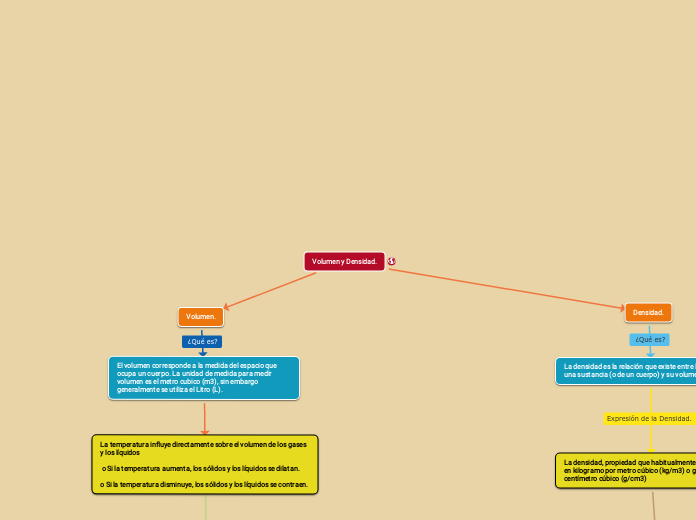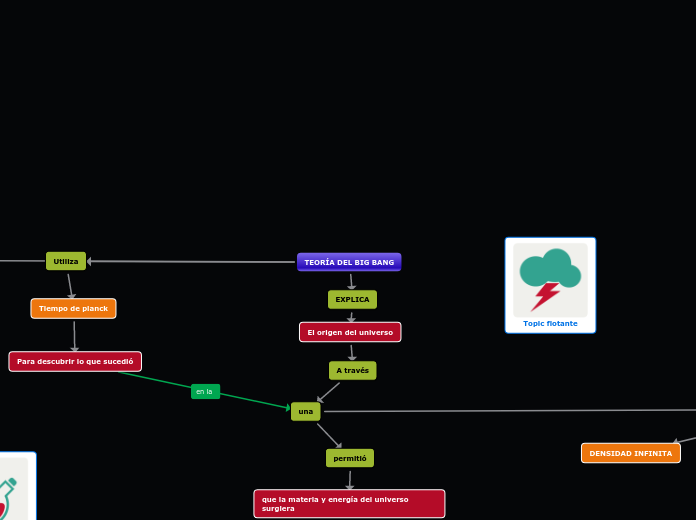CAUSAS DETERIORO DOCUMENTAL
To name your story, you have to think about the overall message and what you want your audience to understand from the story. Also, make it relevant and easy to remember.
EXTERNAS
The middle of the story is where you add layers of complications that will lead to the end. Reveal more about the character's journey. Did their personality go through changes? How did they overcome the challenges? And as you build up the story’s central conflict, make it more personal to that character. Also, from the middle act, you have to lead into the final act.
ANTROPOGENICOS
There wouldn't be any tension and excitement in your story if there weren't any obstacles in your character's way.
Se constituye en el factor de alteración más nocivo para los bienes documentales. Su acción deteriorante involucra todos aquellos manejos y métodos, de carácter permanente, dados en los procesos básicos de organización, manipulación y depósito.
A story is nothing more than a character overcoming a series of difficulties to reach the desired goal. Obstacles usually create suspense and conflict. In overcoming obstacles, there is growth: weak becomes strong; hatred turns into love; sadness into happiness; wrong into right; lies into truth; or evil becomes good.
See a few examples below:
- stopping a meteor
- finding a killer
- finding love
Uso de clips
Ganchos de cosedora
Ganchos de legajar y unidades de conservación
Oxidación entre otros
Manipulación y acciones de tipo vandálico ejercidas por personas mal intencionadas
Roturas
Rasgaduras
Dobleces
RIESGOS DE DETERIORO RELACIONADOS CON FENÓMENOS GEOLÓGICOS
Your character(s) need(s) motivation in order to solve the challenge(s).
INUNDACIONES
Secondary characters also might have motivs beacuse of which they may cross path with main character or which might trigger them to help the main character.
HURACANES
Why does your character need to confront this challenge? What does he/she expect to accomplish by solving it?
See a few examples:
- will marry in 3 days
- can fix the mistakes of the past
RIESGOS DE DETERIORO RELACIONADOS CON FENÓMENOS HIDROMETEOROLÓGICOS
Each story has a main character and that character usually needs to solve a problem or challenge. The character's challenge is the one that creates tension throughout the story.
ERUPCIÓN VOLCÁNICA, FLUJO DE LODO, DESLIZAMIENTOS
MAREMOTOS O TSUNAMI
Type in any other challenges which other characters in the story need to face.
TERREMOTOS
In most stories, there are 3 challenges. The number 3 is a mystical number symbolizing completeness. Try to come up with interesting challenges with which your character needs to struggle.
See a few examples below:
- turns into a werewolf at night
- is sent back in time
INTERNAS
In the beginning of the story (or the exposition), you will need to introduce the setting and characters. You might also want to introduce the main conflict. This part of the story is important because it gives the reader necessary background information and maybe even a first insight into a character’s personality.
FACTORES INDUCIDOS POR EL HOMBRE
The setting (time & place) of a story can change throughout the plot.
Son todos aquellos factores que son ocasionados por el hombre. Se conoce que el ser humano es el mayor causante por pérdida y deterioro de los documentos y materiales de archivo. Las principales razones son por descuido, ignorancia o negligencia.
The weather is an important element in your story because it can highly influence the ambiance and the mood of the characters.
Violencia y robos:
Debido a la pérdida de documentos o materiales de archivo, eliminación de documentos y manipulación atentando contra la integridad de la información.
Decide if you want to include an element of nature in your story. For example, a rainbow can be a very nice choice for a happy ending. The mist in a story can represent mystery and secrets. A thunder can appear in the background at the moment when the 'bad guy' of the story makes its appearance, etc.
Manipulación incorrecta:
Manejo inadecuado al momento de realizar consultas de los documentos físicos. Se pueden presentar rasgaduras, inadecuada manipulación de sustancias liquidas sobre los documentos, manchas de alimentos o marcas por bolígrafos.
Espacios inadecuados: Por la falta de viabilidad al momento de adecuar sitios para los depósitos de archivo.
Does your story include catastrophic weather? See a few suggestions below or add your own:
- hurricane, earthquake, storm, etc
FACTORES AMBIENTALES:
Se refiere al microclima en el cual se encuentran los documentos, relacionado con: humedad, temperatura y luz que influyen en su deterioro.
POLVO: Los contaminantes gaseosos catalizan reacciones químicas nocivas que conducen a la formación de ácidos en las colecciones produciendo amarillamiento, manchas, oscurecimiento y pérdida de resistencia de los materiales. Esto generalmente se evidencia cuando se observan libros o documentos con las orillas oscurecidas mientras que el interior está en buen estado; en el cuero provoca dureza, absorbencia y luego fragilidad.
Luz:
La excesiva luz causa deterioro por la radiación, la luz fluorescente y natural, aceleran el envejecimiento del papel que se hace visible por su amarillamiento y fragilidad.
Si la luz es controlada puede ser beneficiosa y actuar como germicida para determinados microorganismos e insectos.
Emplear una iluminación fluorescente con filtros para la radiación UV, o luminarias incandescentes suficientemente separadas de los fondos para que el calor no les afecte.
Humedad/Temperatura: La exposición a altas temperaturas y a una excesiva humedad, produce descomposición de los materiales y propagación de microorganismos.
La poca humedad y baja temperatura producen fragilidad, envejecimiento y resquebrajamiento del papel.
FACTORES BIOLOGICOS
Characters are essential to a good story. Usually, the protagonist(s) is/are the most affected by the plot. Introduce a character by focusing on their actions, interests, and occupation, as the physical appearance doesn't make a difference in most cases.
insectos
Type in the name of your character.
El piojo del libro: produce orificios muy pequeños. Son de apariencia casi transparente.
Add other qualities/attributes of the character.
Las polillas: su desarrollo se ve influenciado por la temperatura. Afectan a tejidos y papel.
What is your character's main goal?
fight Evilfind lovedefeat his/her enemyrule the worldmake friendstime travelmake an awesome discoveryOther
Las carcomas: sus larvas representan la amenaza más importante puesto que son las que comen, mientras que los adultos solo tienen la función reproductora.
Which traits best describe the character's personality? Choose more if necessary:
introvertedloyalkindindependentquick-thinkingadventuresomeidealisticsweet-naturedcalmrisk-takercreativewittystrictfussyweirdclumsyharshaggressivecarelessclingingcowardlycrueldeceitfulimpulsiveOther
Termitas: la termita “subterránea” se erradica mediante productos químicos no tóxicos para las personas, aunque la erradicación de las humedades elimina la presencia de estas evitando la necesidad de aplicar productos.
Choose the type of your chacter:
Protagonist (main character)Antagonist (main character's opponent)Flat (stereotypical character)Round (his/ her personality develops throughout the story)Static (doesn't evolve as a person throughout the story)Dynamic (dramatical change in personality)Confidant (the main character trusts him/ her)Foil (contrasting character who enhances the personality of another character)Other
